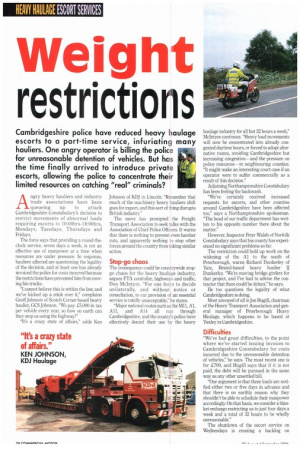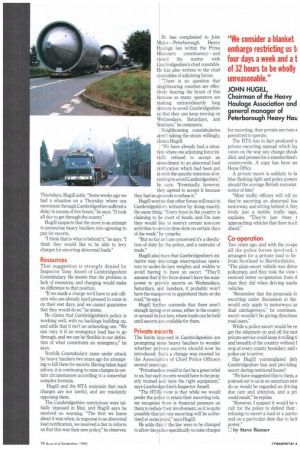Weight
Page 40

Page 41

If you've noticed an error in this article please click here to report it so we can fix it.
restrictions
Cambridgeshire police have reduced heavy haulage escorts to a part-time service, infuriating many hauliers. One angry operator is billing the police for unreasonable detention of vehicles. But has the time finally arrived to introduce private escorts, allowing the police to concentrate their limited resources on catching "real" criminals?
Angry heavy hauliers and industry trade associations have been queueing up to attack Cambridgeshire Constabulary's decision to restrict movements of abnormal loads requiring escorts to 10:00hrs-18:00hrs, Mondays, Tuesdays, Thursdays and Fridays.
The force says that providing a round-theclock service, seven days a week, is not an effective use of manpower at a time when resources are under pressure. In response, hauliers affected are questioning the legality of the decision, and at least one has already invoiced the police for costs incurred because the restrictions have prevented him from moving his trucks.
"I cannot believe this is within the law, and we've kicked up a stink over it," complains Geoff Johnson of Scotch Corner-based heavy haulier, GCS Johnson. "We pay £5,000 in tax per vehicle every year, so bow on earth can they stop us using the highway?"
"It's a crazy state of affairs," adds Ken Johnson of KDJ in Lincoln. "Remember that much of the machinery heavy hauliers shift goes for export, and this sort of thing disrupts British industry"
The move has prompted the Freight Transport Association to seek talks with the Association of Chief Police Officers. It warns that there is nothing to prevent even harsher cuts, and apparently nothing to stop other forces around the country from taking similar action.
Stop-go chaos
The consequence could be countrywide stopgo chaos for the heavy haulage industry, argues FTA controller, highways and traffic, Don McIntyre. "For one force to decide unilaterally, and without notice or consultation, to cut provision of an essential service is totally unacceptable," he states.
"Major national routes such as the M11, Al, All, and A14 all run through Cambridgeshire, and the county's police have effectively denied their use by the heavy haulage industry for all but 32 hours a week," McIntyre continues. "Heavy load movements will now be concentrated into already congested daytime hours, or forced to adopt alternative routes, avoiding Cambridgeshire but increasing congestion—and the pressure on police resources—in neighbouring counties. "It might make an interesting court case if an operator were to suffer commercially as a result of this decision."
Adjoining Northamptonshire Constabulary has been feeling the backwash.
"We've certainly received increased requests for escorts, and other counties around Cambridgeshire have been affected too," says a Northamptonshire spokesman. "The head of our traffic department has written to his opposite number there about the matter."
However, Inspector Peter Walsh of Norfolk Constabulary says that his county has experienced no significant problems so far.
The restriction could hold up work on the widening of the Al to the south of Peterborough, warns Richard Dunkerley of Yate, Bristol-based heavy haulier IJ Dunkerley. "We're moving bridge girders for that project, and I've had to advise the contractor that there could be delays," he says.
He too questions the legality of what Cambridgeshire is doing.
Most annoyed of all is Jon Hugill, chairman of the Heavy Transport Association and general manager of Peterborough Heavy Haulage, which happens to be based at Yaxley in Cambridgeshire.
Difficulties
"We've had great difficulties, to the point where we've started issuing invoices to Cambridgeshire Constabulary for costs incurred due to the unreasonable detention of vehicles," he says. The most recent one is for £700, and Hugill says that if it is not paid, the debt will be pursued in the same way as any other unsettled bill.
"Our argument is that these loads are notified either two or five days in advance and that there is no earthly reason why they shouldn't be able to schedule their manpower accordingly. On that basis, we consider a blanket embargo restricting us to just four days a week and a total of 32 hours to be wholly unreasonable."
The shutdown of the escort service on Wednesdays is creating a backlog on Thursdays, Hugill adds. Some weeks ago we had a situation on a Thursday where one movement through Cambridgeshire suffered a delay in excess of five hours," he says. "It took all day to get through the county."
Hugill suspects that the move is an attempt to pressurise heavy hauliers into agreeing to pay for escorts.
"I think that is what is behind it," he says. "I think they would like to be able to levy charges for escorting abnormal loads."
Resources
That suggestion is strongly denied by Inspector Tony Ansel] of Cambridgeshire Constabulary. He insists that the problem is lack of resources, and charging would make no difference to that position.
"If we made a charge we'd have to ask officers who are already hard-pressed to come in on their rest days, and we cannot guarantee that they would do so," he states.
He claims that Cambridgeshire's policy is working well, with no backlogs building up, and adds that it isn't an unbending one. "We can vary it if an emergency load has to go through, and we can be flexible in our definition of what constitutes an emergency," he says.
Norfolk Constabulary came under attack by heavy hauliers two years ago for attempting to bill them for escorts. Having taken legal advice, it is continuing to raise charges in certain circumstances according to a somewhat complex formula.
Hugill and the HTA maintain that such charges are not lawful, and are resolutely opposing them.
The Cambridgeshire restrictions were initially imposed in May, and Hugi11 says he received no warning. "The first we knew about it was when, in response to an abnormal load notification, we received a fax to inform us that this was their new policy" he observes He has complained to John Major—Peterborough Heavy Haulage lies within the Prime Minister's constituency—and raised the matter with Cambridgeshire's chief constable. He has also written to the chief constables of adjoining forces.
"There is no question that neighbouring counties are effectively bearing the brunt of this because so many operators are making extraordinarily long detours to avoid Cambridgeshire so that they can keep moving on Wednesdays, Saturdays, and Sundays," he comments.
Neighbouring constabularies aren't taking the strain willingly, claims Hugill.
"We have already had a situation where one adjoining force initially refused to accept an amendment to an abnormal load notification which had been put in with the specific intention of rerouting to avoid Cambridgeshire; he says. "Eventually, however, they agreed to accept it because they had no grounds to refuse it."
Hugill worries that other forces will react to Cambridgeshire's initiative by doing exactly the same thing. "Every force in the country is claiming to be short of funds, and I'm sure they would like to restrict certain non-core activities to certain time slots on certain days of the week," he remarks.
"But so far as I am concerned it's a dereliction of duty by the police, and a restraint of trade."
Hugill also fears that Cambridgeshire's initiative may encourage unscrupulous operators to under-declare weights and widths to avoid having to have an escort. "They'll assume that if the force doesn't have the manpower to provide escorts on Wednesdays, Saturdays, and Sundays, it probably won't have the manpower to apprehend them on the road," he says.
Hugill further contends that there aren't enough laying-over areas, either in the county or around its borders, where loads can be held until escorts are available for them.
Private escorts
The limits imposed in Cambridgeshire are prompting some heavy hauliers to wonder whether private escorts should now be introduced. Such a change was mooted by the Association of Chief Police Officers several years ago.
"Privatisation would in fact be a great relief to us, but such escorts would have to be properly trained and have the right equipment," says Cambridgeshire's Inspector AnseII.
"The HTA!s view is that while we would prefer the police to retain their escorting role, we recognise there is financial pressure on them to reduce their involvement, so it is quite possible that private escorting will be authorised at some point," says Hugill.
He adds that if the law were to be changed to allow the police specifically to raise charges for escorting, then private services s permitted to operate.
The HTA has in fact produced a private escorting manual which la}, views on the way any change shouli died, and presses for a standardised countrywide. A copy has been sei Home Office.
A private escort is unlikely to lx blue flashing light and police power: should the average British motorist notice of him?
"Most traffic officers will tell yo they're escorting an abnormal low motorway, and sitting behind it, the) tively just a mobile traffic sign, explains. "They're just there t approaching vehicles that there is a Ii ahead."
Co-operation
Two years ago, and with the co-ope all the police forces involved, t arranged for a private load to be from Scotland to Hertfordshire, "The plain escort vehicle was drive policemen, and they took the view 1 received better co-operation from ti than they did when driving mark( vehicles.
"Remember that the proposals fo escorting under discussion at the would only apply to motorways ar dual carriageways," he continues. escort wouldn't be giving directions road users."
While a police escort would be re get the shipment on and off the mot private service could keep it rolling ti and breadth of the country without I stop at every county boundary and 1. police car to arrive.
Has Hugill contemplated defy Cambridgeshire ban and providing escort during restricted hours?
"We have suggested this to them, a pointed out to us in no uncertain tern do so would be regarded as driving due care and attention, and a pr.( could result," he replies.
"However, 1 suspect it would be v cult for the police to defend their . refusing to escort a load at a partici and on a particular date due to lacli power."
0 by Steve Banner








































































































